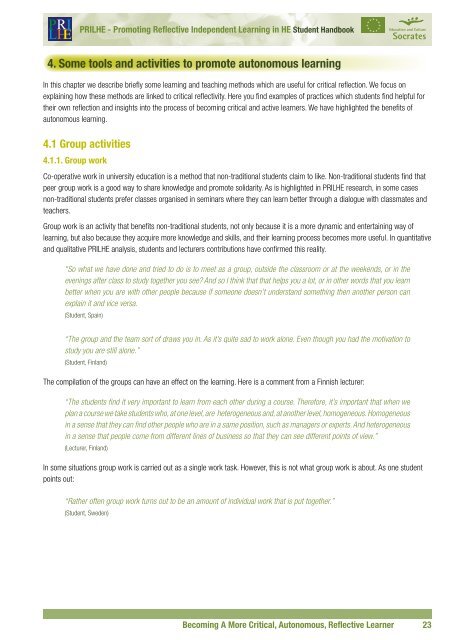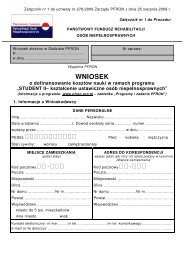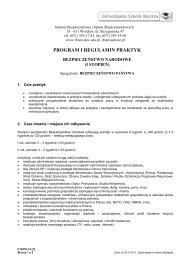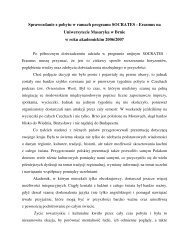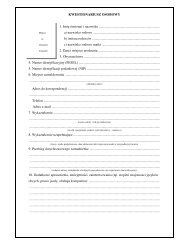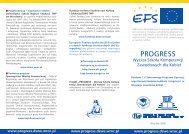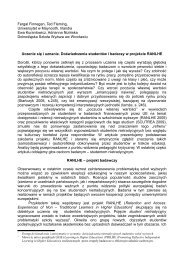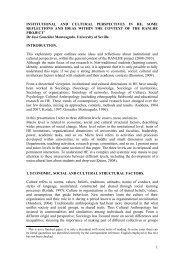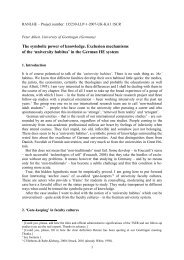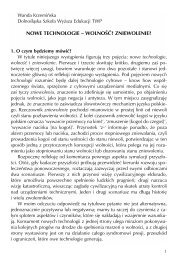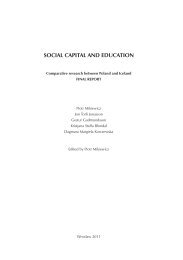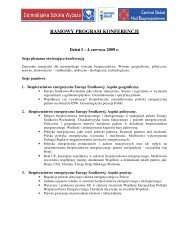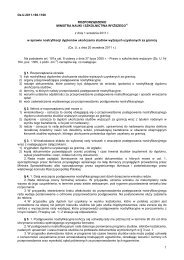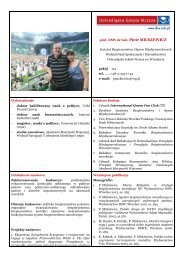PRILHE - Promoting <strong>Reflective</strong> Independent Learning in HE Student HandbookKarl described also a changed relationship with his parents, “they have also noticed that I have developed and become moretedious, despite the fact my parents are educated ”. He concludes his experiences with an ironical glint in his eyes and formulatesit as follows:“You start your education happily and end it embittered, it is almost like that. The relationship with my male friend isnot the same anymore, we are not the fun guys any longer but now we can sit and talk in telephone and complaintogether”.(Student, Sweden)To face this change or development might be an emotional experience that is not always pleasant. Rather it is impregnated bycontradictory emotions, where the individual sometimes feel stimulated, happy and safe and sometimes feel unhappy, guilty andfrustrated. To develop critical autonomous reflection is therefore also an emotional journey that must not be neglected orunderestimated. Brookfield has given experiences like Karl’s a name that is a little bit brutal but also illustrative; cultural suicide,“Cultural suicide is the threat critical learners perceive that if they take a critical questioning of conventional assumptions,justifications, structures and actions too far they will risk being excluded from the cultures that have defined andsustained them up to that point in their lives.”(Brookfield 1994, p. 208).To a student this can mean becoming a foreigner in his or her own family or together with his/her old friends. The things they werelaughing about together before is maybe not any longer commonly appreciated and a gap between them might be felt by one ofthem or maybe by both of them. Marriage might end up in divorces and friendships might fade away. One important way to handlethose emotional aspects of reflective learning is to share it with other students in communication. When talking to each other,students discover that they are not alone experiencing those emotions. This discovery is often relieving to them and to put wordson what is difficult can play down some of the difficulties experienced.Another connected concept by Brookfield (ibid.), Lost innocence, describes education as a journey into ambiguity and uncertainty.The belief in one truth is abandoned as well as a dualistic thinking by the learner. This personal development is well described inmany of the interviews and often it is experienced as a positive development .Here is a German lecturer’s viewpoint:“I would say you can distinctly observe here, that especially mature students, even the postgraduate students, facemassive biographical problems they have to cope with and that you cannot really call this study. Simply due to the factthat they are studying here something is stirred that then is messed up and so they have to reconcile all this somehow.Of course this works only by means of an increased theoretical effort that you reflect upon and that then allows a newview on the things. In so far it is not that easy if you are studying here at an older age. I myself experienced this andhave to admit to myself that this was my greatest problem. If you really let this happen to you, you have to alterattitudes and opinions showing through biographically. And then you are having a big problem, since you do not onlyhave to learn this about yourself, but you really have to change yourself and maybe to alter your whole idea of your life.And this is not too easy.”(Lecturer, Germany)Questions for Discussion / Reflection•••What are your own supportive environments and resources?How do you see your role in your study group, what does the feeling of belonging to the group mean to you?What can you do to help others feel as part of the group?In the PRILHE literature review Brookfield’s concepts are described more in depth.22<strong>Becoming</strong> A <strong>More</strong> <strong>Critical</strong>, <strong>Autonomous</strong>, <strong>Reflective</strong> <strong>Learner</strong>
PRILHE - Promoting <strong>Reflective</strong> Independent Learning in HE Student Handbook4. Some tools and activities to promote autonomous learningIn this chapter we describe briefly some learning and teaching methods which are useful for critical reflection. We focus onexplaining how these methods are linked to critical reflectivity. Here you find examples of practices which students find helpful fortheir own reflection and insights into the process of becoming critical and active learners. We have highlighted the benefits ofautonomous learning.4.1 Group activities4.1.1. Group workCo-operative work in university education is a method that non-traditional students claim to like. Non-traditional students find thatpeer group work is a good way to share knowledge and promote solidarity. As is highlighted in PRILHE research, in some casesnon-traditional students prefer classes organised in seminars where they can learn better through a dialogue with classmates andteachers.Group work is an activity that benefits non-traditional students, not only because it is a more dynamic and entertaining way oflearning, but also because they acquire more knowledge and skills, and their learning process becomes more useful. In quantitativeand qualitative PRILHE analysis, students and lecturers contributions have confirmed this reality.“So what we have done and tried to do is to meet as a group, outside the classroom or at the weekends, or in theevenings after class to study together you see? And so I think that that helps you a lot, or in other words that you learnbetter when you are with other people because if someone doesn’t understand something then another person canexplain it and vice versa.(Student, Spain)“The group and the team sort of draws you in. As it’s quite sad to work alone. Even though you had the motivation tostudy you are still alone.”(Student, Finland)The compilation of the groups can have an effect on the learning. Here is a comment from a Finnish lecturer:“The students find it very important to learn from each other during a course. Therefore, it’s important that when weplan a course we take students who, at one level, are heterogeneous and, at another level, homogeneous. Homogeneousin a sense that they can find other people who are in a same position, such as managers or experts. And heterogeneousin a sense that people come from different lines of business so that they can see different points of view.”(Lecturer, Finland)In some situations group work is carried out as a single work task. However, this is not what group work is about. As one studentpoints out:“Rather often group work turns out to be an amount of individual work that is put together.”(Student, Sweden)<strong>Becoming</strong> A <strong>More</strong> <strong>Critical</strong>, <strong>Autonomous</strong>, <strong>Reflective</strong> <strong>Learner</strong> 23


